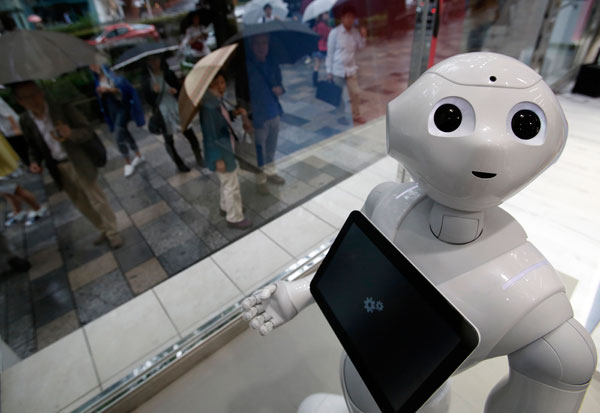 |
A cooing, gesturing humanoid on wheels that can decipher emotions has been unveiled in Japan by billionaire Masayoshi Son who says robots should be tender and make people smile.
Son's mobile phone company Softbank said the robot, which it has named Pepper, will go on sale in Japan in February for 198,000 yen ($1,900). Overseas sales plans are being considered.
The machine, which has no legs but has gently gesticulating hands, appeared on a stage in a Tokyo suburb, cooing and humming. It dramatically touched hands with Son.
The billionaire, who told the crowd his longtime dream was to go into the personal robot business, said Pepper has been programmed to read the emotions of people around it by recognizing expressions and voice tones.
"Our aim is to develop affectionate robots that can make people smile," he said.
The 121-cm-tall, 28-kg Pepper, which has no hair but two large doll-like eyes and a flat-panel display on its chest, was developed jointly with Aldebaran Robotics, which produces autonomous humanoid robots.
Pepper is loaded with more than a dozen sensors, including two touch sensors in its hands and three touch sensors on its head. It also has two cameras and four microphones on its head and has Wi-Fi and Ethernet networking capabilities.
However, a demonstration at a Softbank retailer in Tokyo on Friday highlighted the robot's shortcomings as much as its charm.
Voice recognition takes a while to kick in, when its eyes light up in a listening mode after the robot stops talking, making for less than spontaneous dialogue.
Pepper was more at ease going into its own chatter, such as asking, "Do you do Twitter?" or "Is this the first time you ever spoke to a robot?" But it wouldn't really wait for an answer, rattling on to the next topic.
Sometimes the robot, which, up close, bears a resemblance to C-3PO in Star Wars, failed to catch a speaker's words and would ask: "I could not hear you. Could you say that again?"
When a person shouted to test how well it read emotions, it didn't do much apart from saying, "You look like an honest person."
In a demonstration on Thursday, Pepper sang I Want to be Loved, and it performed more singing and gesturing on Friday.
But all its song-and-dance acts seemed to prove was that the machine needs to learn a lot more tricks to impress robot-savvy Japanese. The Softbank shop barely drew a crowd besides a pack of reporters with their cameras.
Cuddly robots are nothing new in Japan, a nation dominated by kawaii, or cute culture, but no companion robot has emerged as a major market success yet.
Sony Corp discontinued the Aibo pet-dog robot in 2006, despite an outcry from its fans. At the time, Sony had developed a child-shaped entertainment robot similar to Pepper but much smaller, capable of dances and other charming moves, but it never became a commercial product.
Honda Motor Co has developed the walking, talking Asimo robot, but that is too sophisticated and expensive for home use and appears in the company's showrooms and gala events only. Even then, it is prone to glitches because of its complexity.
Many other Japanese companies, including Hitachi and Toyota Motor Corp, have developed various robots that entertain and serve as companions.
The potential is great for intelligent machines, as the number of elderly people requiring care is expected to soar in rapidly aging Japan in coming years. Robotic technology is already used to check on the elderly and monitor their health and safety, but robots might also play a role in reducing feelings of loneliness.
Softbank, which boasts more than 100 million subscribers globally, has been growing rapidly as a mobile carrier in Japan, boosted by being the first to offer Apple's iPhone.
Aldebaran Robotics, which has offices in China, France, Japan and the United States, is 78.5 percent owned by Softbank.
Bruno Maisonnier, founder and chief executive of Aldebaran, who appeared on the stage with Son, said, "I believe that the most important role of robots will be as kind and emotional companions to enhance our daily lives, to bring happiness and constantly surprise us."
Associated Press
